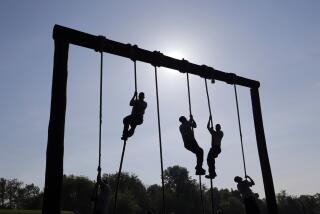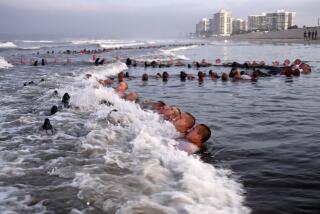He Keeps the Midshipmen in Shape : Health: Naval Academy freshmen huff and puff to keep up with fitness instructor three times their age.
ANNAPOLIS, Md. — It is a muggy August morning and the sun is just beginning to appear over the rippled waters of the Severn River. A thousand teen-agers, the newest class of the U.S. Naval Academy, are struggling to keep pace with the man putting them through a vigorous workout.
“Left, right, left, right. Ankle action, knee action, hip action,” Heinz Lenz exhorts his young charges in a voice that still carries traces of the accent of his native Germany.
Atop a platform where he can survey the midshipmen arrayed before him, Lenz does every sit-up with the Naval Academy freshmen. Every pushup. Every bend, twist and jump of a 40-minute regimen designed to put the young men and women in the best shape of their lives.
“He is amazing,” said Graham Hawkinson, a 19-year-old plebe from Pleasantown, Calif.
Pulled out of formation for a quick interview, Hawkinson gasps for breath as he answers questions.
“I’m out there totally dead, absolutely wasted, and he’s sitting there just pumping out pushups,” Hawkinson said. “He really pushes you. He won’t let you relax.”
There is a mixture of respect and admiration, even a touch of fear, in the way Hawkinson and other midshipmen speak of Lenz.
There is also a bit of mythology that has built up around the man who has been a coach and physical education instructor at the Naval Academy since 1957.
Midshipmen will tell you that Lenz is in his 70s, that he was once an officer in the German navy, that he bicycles many miles to work each day, that he has been putting plebes through physical training programs for 50 years.
None of this is true.
Lenz, 66, was born in Germany in 1925, but left 11 years later, long before he was old enough for naval service.
“Dad had a lot of Jewish friends and colleagues, and he felt very uncomfortable staying in Germany,” Lenz recalled.
The family moved first to Italy, then three years later to the United States, where his father taught Greek and Latin and his mother French and German at Yale University.
Lenz joined the U.S. Navy in 1943. After the war he taught in prep school before coming to the academy. In 1969, he began running the physical training program for plebes, or freshmen.
The exercise routine varies from morning to morning during plebe summer, but it is built around a set of 18 exercises interspersed with brief sprints on the artificial turf athletic field.
Lenz said his program is aimed at more than just getting the plebes ready for a rigorous four years at the academy.
“The key that we stress to the plebes is that we are even more concerned with their physical fitness 20 years from now than with their physical fitness now,” Lenz said. “That’s the goal. Fit for life.”
Out on the athletic field, the plebes are going through their paces before an admiring audience of parents. Mothers and fathers from across the country have come to Annapolis to see their sons and daughters for the first time since they entered the academy six weeks earlier.
Irene Stevens of Denver watches from the sidelines even though her daughter, Heather, has been excused from physical training because of a minor injury. Irene Stevens was on the practice field by 6 a.m. because she wanted to see the man and the program her daughter had written about.
When Heather learned that the physical training program would be run by a man almost four times her age, “she thought it was going to be easy,” her mother said. “Then she realized he could outrun them all, outdo them all.”
As the 40-minute session nears an end, Lenz begins 60 seconds of sit-ups, the difficult kind performed with arms folded across the chest.
Down on the field, some plebes are cheating a bit, cupping their hands behind their heads to get a little extra lift or resting for three or four seconds.
But up on the platform Lenz keeps a rhythmic, steady pace, popping up and down to the beat of rock music floating across the field. The sit-ups appear effortless. His voice is firm and steady as he calls out encouragement and instructions.
Arlene Miskelly’s son, Bill, had written her about the old man who can outperform the midshipmen, and she sends her husband off to get him on videotape to show friends back in Ft. Wayne, Ind.
“I kept saying that can’t be him. He’s incredible,” she said.


